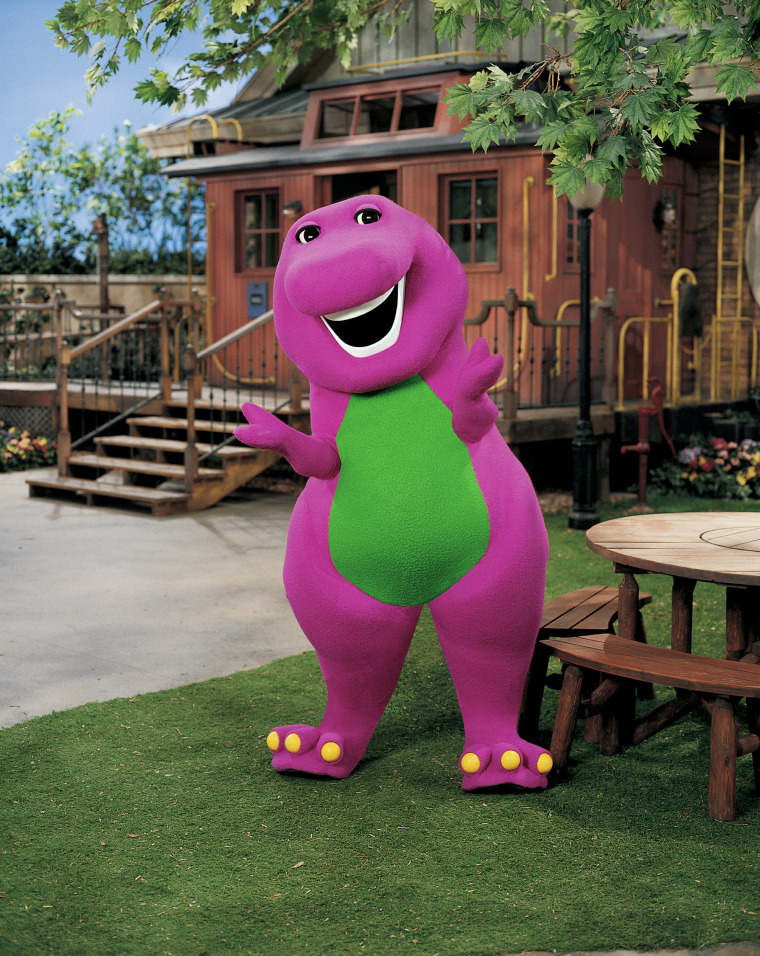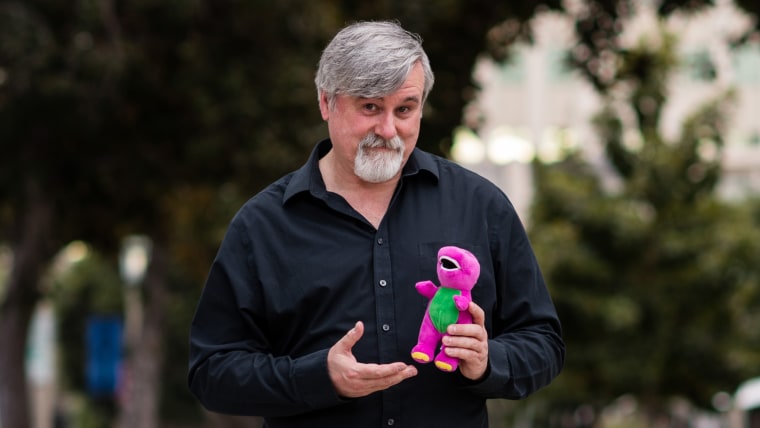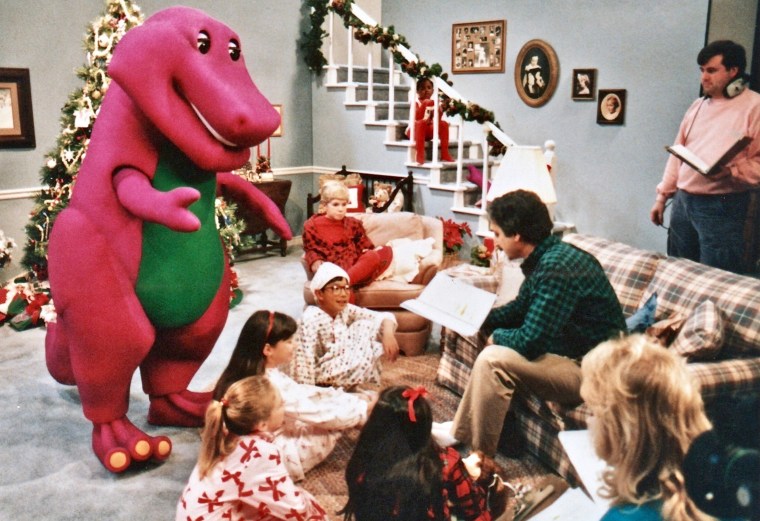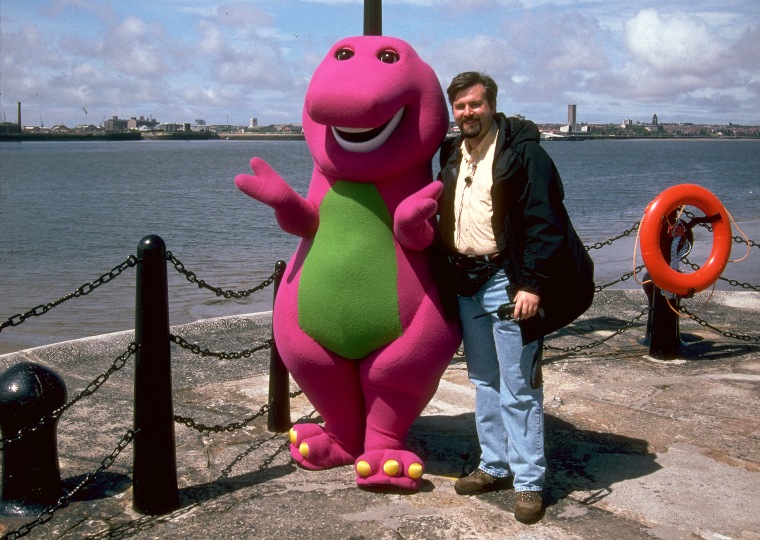“Barney & Friends” was a mainstay of daytime television in the early 1990s, making a star out of the title character: a purple anthropomorphic T. rex who extolled the virtues of love, kindness and cleaning up your toys.
The character was an avatar of goodness, endearing himself to countless young children around the world even as he sometimes grated on their beleaguered parents. He was inescapable.
But not everyone considered Barney a friend, a phenomenon at the heart of a new Peacock documentary series called “I Love You, You Hate Me.” (NBC News and Peacock are both owned and operated by NBCUniversal.)
The docuseries explores how, throughout the ‘90s and early 2000s, Barney turned into a cultural punching bag, the subject of disdain from adults and derision from kids desperate to disavow their childish pastimes. He was the Jar Jar Binks of kids’ TV.
School-age kids added violent lyrics to the “Barney & Friends” theme song. NBA great Charles Barkley beat up Barney in a “Saturday Night Live” sketch. Urban legends about the character's dark secrets sprung up. The internet gave rise to new genres of anti-Barney humor that freely mixed winking irony with seemingly real rage.
“Barney is on the receiving end of more hostility than just about any other popular cultural icon I can think of,” the University of Chicago academic W.J.T. Mitchell wrote in 1998. “Parents admit to a cordial dislike of the saccharine saurian, and no self-respecting second-grader will admit to liking Barney.”

Bob West, a veteran performer who provided the voice for Barney from 1992 to 2000, recalls the production of “Barney & Friends” as a blissful experience that was sometimes shadowed by darker intrusions from the wider world, like a string of death threats he says he received via email.
In a phone interview last week, West (who appears in the docuseries) reflected on the success of “Barney & Friends” and offered a few theories on why Barney proved to be such a lightning rod. In his mind, the backlash was driven in part by kids trying hard to flex their “machismo.”
Thirty years after Barney first showed up on TV, however, West still believes that Barney's friends outnumber his haters.
The conversation has been lightly edited for length and clarity.
NBC News: I've read that you started working as a voice performer in the late 1970s. How exactly did you wind up voicing Barney?
Bob West: I started doing commercial work and narration in 1979 or so. I put together the world’s looniest demo tape. I had done some costumed character work. I worked as a robot character called The Blaster for a hospital in the Dallas area.
My agent recommended me to Dennis DeShazer, who was one of the producers of “Barney & Friends.” I auditioned with a lot of other folks. Because of a fluke, they had started to build the costume before casting the voice. I was too tall for the costume. [The costume actor] David Voss, who was shorter than me, fit the costume while I got the voice. We just synced up together.

“Barney & Friends” was a genuine pop culture phenomenon. The show was ubiquitous when I was growing up in the ‘90s. What did it feel like to be at the center of such a big hit?
It was completely surreal. We were in the studio so often, and we really didn’t see a lot of the reaction to the show. But then we would go out and do personal appearances, and we’d have meet-and-greets with kids and parents. We’d get to see the love that was being poured out toward Barney, and that was just amazing.
When you show up at a shopping mall in Hartford, Connecticut, and the sidewalks are lined with parents and strollers, and you get inside, where you expect 600 people but there’s 6,000, that’ll bring you to the present. [Laughs.] It’s a pretty good indication the love was strong.
When did you first start to realize there was all this hatred swirling around the show, though?
I have been online since way before most people accessed the internet. I had heard about some internet groups that were out there doing this role-play thing where they were fighting Barney because he was evil and such. But that turned out to be all in good fun. They were really good at it. [Laughs.] I actually logged in and said hello. They were very receptive to me, very nice.
Every once in a while I’d go out in a Barney jacket and I’d hear, “Oh, I hate that show!” It was kind of sad, but you just have to laugh it off.
In the docuseries you say you received death threats around this time, which is horrible. Did you ever get a sense of the specific motivations behind the messages?
The specific motivation was growing up. The people who sent me those threats were all kids in middle school. They were doing the thing where they’re trying to throw off childhood and trying to be cool. I’m sure a lot of them were having emotional issues or maybe they were having trouble at home. There’s just no way to know.
But usually when people lash out like that, there’s something they’re dealing with. They’re hurting, and that’s the only way to know how to cope.
I actually responded to a lot of them — when I was still on AOL and it was cool to be on AOL — and most of them would write back and say, “Oh, I’m so sorry, I didn’t realize there was a real person that was going to answer.” I never heard back from some.
It’s really part of growing up, although I have to say that we seem to have amplified that phase of life in the United States. I don’t recall that kind of backlash happening in other countries. We would go to Ireland or wherever, and there were kids in the audience who were 12 years old, singing along. I think there might be a cultural difference.
What is it about American culture or the American psyche that fosters what you’re describing?
I think we have this focus on, and sometimes an obsession with, rugged individualism. I won’t go into an analysis of John Locke or anything. But there’s a kind of machismo that kids are encouraged to adopt when they’re growing up, and I think that is a big contributor.
I think consumerism is a big contributor, too, because a lot of kids are pressured to wear the coolest thing or buy the coolest toy, so that feeds into it. I think we’ve got some growing up to do as a society in terms of learning to live together and support each other, and to put the community before the individual.

If the show premiered today, do you think there would be a comparable backlash?
I think that’s very possible. I think that innocence is valued in different ways by different people. Barney will always have a place in education, in culture, in helping kids grow up feeling safe. Who knows how long this current wave of social and political clashing will continue?
Barney was loved by far more people than he was ever hated. It’s not a true statement to say that he was equally loved and hated. The millions and millions of people who watched the show … they loved it.
It’s easy to amplify the negative voices, and I think that we examine the negative feedback and call it what it is: somebody is reacting to innocence in a negative way, and we need to find out why. We need to talk about it. If we don’t, that kind of thing can snowball on you.
Did all of this take a toll on you personally?
It’s funny — after the fact, we’re hearing more about the hate than we did then. I have to say it didn’t really take much of a toll on me at the time.
When social media started taking off, especially when Facebook got rolling, I started to reconnect with old friends from college. Several guys said, “I used to absolutely hate that show. But then I had a child, and now I get it and I love the show because my child loves the show.”
It’s been reported that Oscar-winning actor Daniel Kaluuya is developing a live-action Barney film. Has anyone involved in that project reached out to you?
I would say, first of all, there’s been a lot of clickbait about the project. [Laughs.] There’s been a lot of bloggers and folks who love to say, “Oh, this project is going to be so dark.” But as far as I know, Daniel has never said anything about the project being dark. It’s a meme that was created.
I have not been contacted by the production. I would love to take a meeting with Daniel, and I would love to talk to him about doing the voice. I have a vested interest in seeing that the tradition of the character is honored. But on the other hand, I totally understand the impulse to expand the character and bring in new subject matter.

